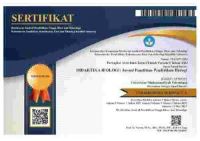HUBUNGAN ANTARA ECOLITERACY DAN WILLINGNESS TO PAY MAHASISWA BIOLOGI UNTUK MEMBAWA SCHOOL LUNCH
Abstract
Ecoliteracy merupakan faktor penting yang terkait dengan willingness to pay (WTP) untuk membawa school lunch. Tujuan dari penelitian ini adalah untuk mengetahui hubungan antara ecoliteracy dan willingness to pay mahasiswa biologi membawa school lunch. Penelitian ini dilaksanakan pada bulan Juli-Agustus 2016 di Universitas Negeri Jakarta. Metode yang digunakan adalah metode deskriptif dengan teknik survei melalui studi korelasional. Pengambilan sampel dilakukan secara simple random sampling. Jumlah sampel dalam penelitian ini sebanyak 89 mahasiswa biologi yang telah mengambil mata kuliah Ekologi dan Ilmu Lingkungan. Setelah diuji prasyarat, data penelitian tidak berdistribusi normal dan homogen, sehingga penelitian ini menggunakan uji non parametrik dengan menghitung koefisien korelasi Spearman’s Rank. Koefisien korelasi yang diperoleh adalah 0,552, yang berarti terdapat hubungan yang cukup kuat antara ecoliteracy dengan WTP mahasiswa biologi untuk membawa school lunch. Ecoliteracy yang dimiliki oleh mahasiswa ini memberikan bekal untuk berani mengambil sikap terhadap lingkungan, dalam hal ini membawa school lunch. Keberanian dalam mengambil sikap peduli lingkungan inilah yang dimaksud dalam penelitian ini disebut willingness to pay (WTP).
Ecoliteracy is an important factor related to willingness to pay (WTP) to bring school lunch. The purpose of this study was to determine the correlation between ecoliteracy and willingness to pay (WTP) of biology students to bring school lunch. This study was conducted on July-August 2016 at Jakarta State University. The method used is descriptive method with survey through correlational study. Simple random sampling was used in this study. The number of samples in this study were 89 biology students who had taken Ecology and Environmental Science courses. After testing the prerequisites, the data was not normally distributed and homogeneous, so this study used a non-parametric test by calculating the Spearman's Rank correlation coefficient. The correlation coefficient obtained was 0.552, which means there was strong enough correlation between ecoliteracy and WTP of biology students to bring school lunch. Ecoliteracy which was owned by these students provided provisions to take a stand on the environment, in this case was bringing school lunch. Courage in taking the attitude of caring for the environment is what was meant in this study as willingness to pay (WTP).
Keywords
Full Text:
PDFReferences
Capra, F. (1997). The Web of Life: A New Scientific Understanding of Living Systems. NewYork: Anchor Books.
Center for Ecoliteracy. (2010). Rethinking School lunch Guide. Second Edition. Barkeley: Center for Ecoliteracy.
Chan, K. (2000). Market Segmentation of Green Consumers in Hong Kong. Journal of International Consumer Marketing, 12 (2), 7-24. https://doi.org/ 10.1300/J046v12n02_02
Cutter-Mackenzie, A., & Smith, R. (2003). Ecological Literacy: The ‘Missing Paradigm’ in Environmental Education (part one). Environmental Education Research, 9 (4), 497-524. https://doi.org/10.1080/1350462032000126131
Dhokhikah, Y., & Trihadiningrum, Y. (2012). Solid Waste Management in Asian Developing Countries: Challenges and Opportunities. Journal of Applied Environmental and Biological Sciences, 2 (7), 329-335.
D'Souza, C., Taghian, M., & Lamb, P. (2006). An Empirical Study on the Influence of Environmental Labels on Consumers. Corporate Communications: An International Journal, 11 (2), 162-173. https://doi.org/10.1108/ 13563280610661697
Hammond, S.W., & Herron, S.S. (2011). The Natural Provenance: Ecoliteracy in Higher Education in Mississippi, Environmental Education Research, 18 (1), 117-132. https://doi.org/10.1080/ 13504622.2011.583982
Kosasih, D. (2016), Jakarta Hasilkan 7.000 Ton Sampah per Hari. Diunduh pada 25 Februari 2016, dari http://www.greeners.co/berita/jakarta-hasilkan-7000-ton-sampah-per-hari/
Lou, X.F., & Nair, J. (2009). The Impact of Landfilling and Composting on Greenhouse Gas Emissions – A review. Journal Bioresource Technology, 100, 3792-3798. https://doi.org/10.1016/ j.biortech.2008.12.006
McBride, B.B., Brewer, C.A., Berkowitz, A.R., & Borrie, W.T. (2013). Environmental Literacy, Ecological Literacy, Ecoliteracy: What Do We Mean and How Did We Get Here? Ecosphere, 4 (5), 1-20. https:// doi.org/10.1890/ES13-00075.1
Ngoc, U.N., & Schnitzer, H. (2009). Sustainable Solutions for Solid Waste Management in Southeast Asian Countries. Waste Management, 29, 1982-1995. https://doi.org/10.1016/j.wasman. 2008.08.031
Orr, D.W. (1992). Ecological Literacy Education and the Transition to a Postmodern World. Albany: SUNY Press.
Pasang, H., Moore, G.A., & Sitorus, G. (2007). Neighbourhood-Based Waste Management: A Solution for Solid Waste Problems in Jakarta, Indonesia. Waste Management, 27, 1924-1938. https:// doi.org/10.1016/j.wasman.2006.09.010
Pilgrim, S., Smith, D., & Pretty, J. (2007). A Cross-Regional Assessment of The Factors Affecting Ecoliteracy: Implications for Policy and Practice. Ecological Applications, 17 (6), 1742-1751. https://doi.org/10.1890/06-1358.1
Rejikumar, G. (2016). Antecedents of Green Purchase Behaviour: An Examination of Moderating Role of Green Wash Fear. Global Business Review, 17 (2), 1-19. https://doi.org/10.1177/0972150915619812
Riduwan. (2014). Dasar-dasar Statistika. Bandung: Alfabeta Press.
Undang-undang No. 12 Tahun 2012 tentang Pendidikan Tinggi. Lembaran Negara RI Tahun 2012, No. 158. Kementerian Sekretariat Negara. Jakarta.
Tsen, C., Phang, G., Hasan, A., & Buncha, M.R. (2006). Going Green: A Study of Consumers’ Willingness To Pay For Green Products in Kota Kinabalu. International Journal of Business and Society, 7 (2), 40-54.
Ulusoy, E., & Barretta, P.G. (2016) "How Green are You, Really? Consumers’ Skepticism Toward Brands With Green Claims", Journal of Global Responsibility, 7 (1), 72-83. https://doi.org/10.1108/JGR-11-2015-0021
Utami, I.W., & Indra, H. (2015). Faktor-faktor yang Mempengaruhi Pembelian Mi Instan pada Mahasiswa. Gema, XXVII/49/Januari 2015, 1491-1496.
DOI: https://doi.org/10.32502/dikbio.v3i1.1570
Copyright (c) 2019 Didaktika Biologi: Jurnal Penelitian Pendidikan Biologi
Didaktika Biologi: Jurnal Penelitian Pendidikan Biologi is indexed by:

Didaktika Biologi: Jurnal Penelitian Pendidikan Biologi is licensed under a Creative Commons Attribution-ShareAlike 4.0 International License.







